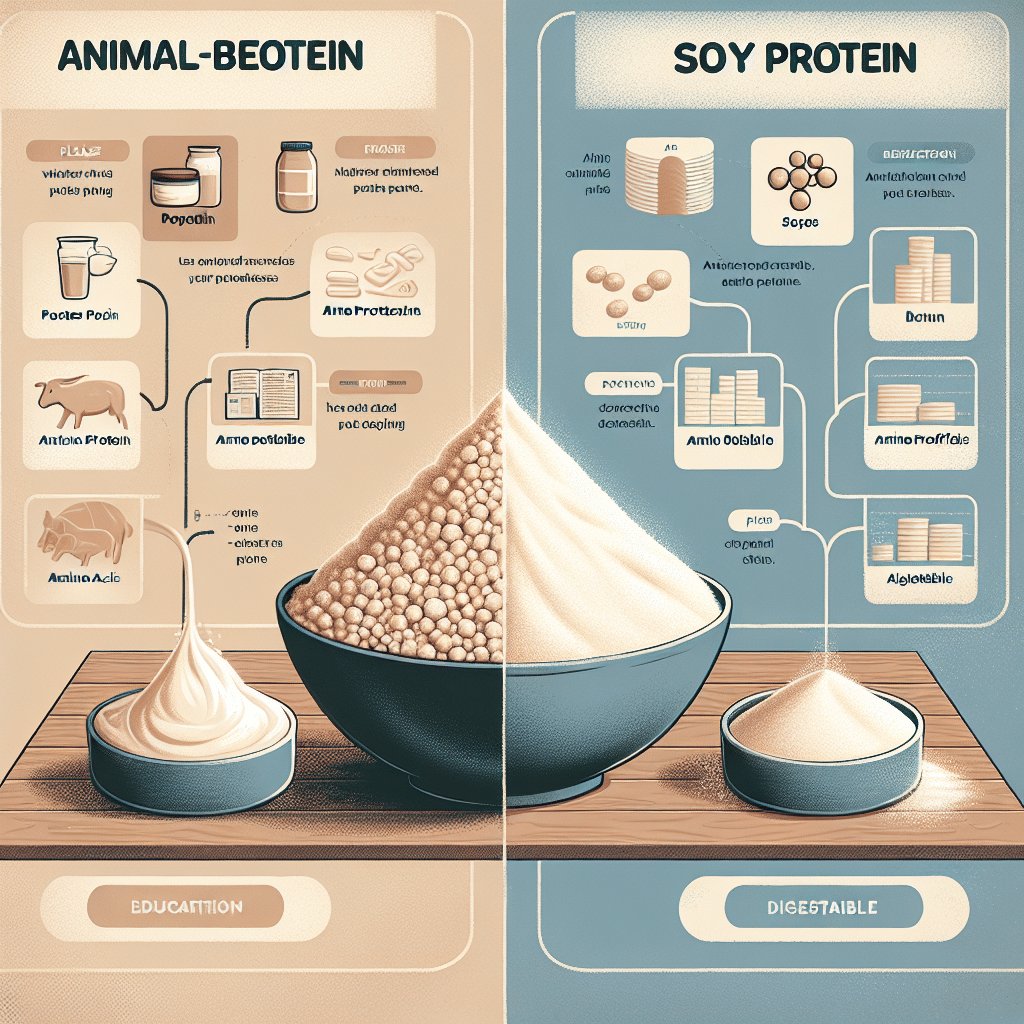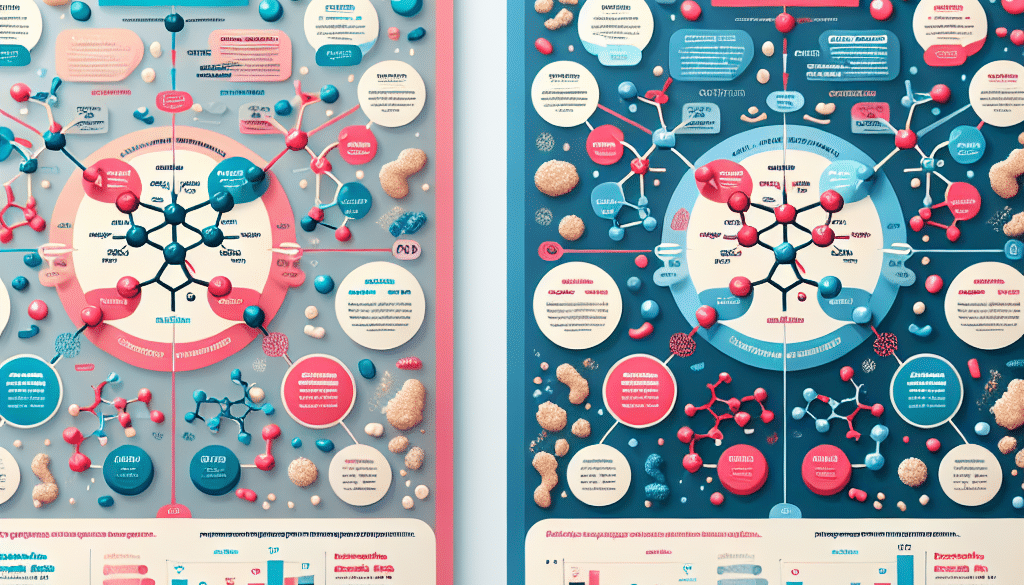What Is The Difference Between Protein And Soy Protein?
-
Table of Contents
Protein vs. Soy Protein: Understanding the Differences

Proteins are fundamental components of all living organisms and are crucial for the body’s structure, function, and regulation of tissues and organs. They are made up of amino acids, which are organic compounds that combine to form proteins. Proteins can be derived from various sources, including animals and plants. Among the most popular plant-based proteins is soy protein, which has gained attention for its health benefits and versatility. In this article, we will explore the differences between general protein sources and soy protein, their nutritional profiles, benefits, and potential drawbacks.
What is Protein?
Protein is a macronutrient essential for building muscle mass and performing vital bodily functions. It is found in a variety of food sources, both animal and plant-based. Animal-based proteins, such as meat, dairy, and eggs, are considered complete proteins because they contain all nine essential amino acids that the human body cannot synthesize on its own. Plant-based proteins, such as beans, lentils, and nuts, often lack one or more of these essential amino acids, making them incomplete proteins.
What is Soy Protein?
Soy protein is a protein that comes from soybeans, a legume that is native to East Asia. It is a complete protein, containing all nine essential amino acids. Soy protein is available in various forms, including soy protein isolate, soy protein concentrate, and textured soy protein. It is commonly used as a meat substitute, in protein powders, and as an additive in various food products.
Nutritional Comparison
When comparing soy protein to other protein sources, it’s important to consider their nutritional content. Here’s a breakdown of the key nutritional differences:
- Amino Acid Profile: Soy protein contains all nine essential amino acids, making it comparable to animal proteins in terms of amino acid profile.
- Fat Content: Soy protein is generally low in fat, whereas some animal proteins, especially red meats, may contain higher levels of saturated fats.
- Cholesterol: Soy protein is naturally cholesterol-free, while animal proteins can contain varying amounts of cholesterol.
- Fiber: Unlike animal proteins, soy protein can contain fiber, especially in forms like textured soy protein.
- Phytoestrogens: Soy protein contains isoflavones, a type of phytoestrogen that can have both positive and negative health effects.
Health Benefits of Soy Protein
Soy protein offers several health benefits, which have been supported by various studies:
- Heart Health: Consuming soy protein may help lower levels of LDL cholesterol, which is associated with a reduced risk of heart disease.
- Weight Management: Soy protein can promote satiety, which may aid in weight management efforts.
- Muscle Building: As a complete protein, soy can support muscle building and repair, making it a suitable alternative to animal proteins for athletes and bodybuilders.
- Bone Health: Some studies suggest that soy protein, with its isoflavones, may have a positive effect on bone density.
Potential Drawbacks of Soy Protein
While soy protein has many benefits, there are also potential drawbacks to consider:
- Allergies: Soy is one of the eight major food allergens and can cause reactions in some individuals.
- Phytoestrogens: The isoflavones in soy can mimic estrogen in the body, which has raised concerns about their effects on hormone-sensitive conditions.
- Genetic Modification: A significant portion of soy grown today is genetically modified, which is a concern for those seeking non-GMO foods.
Environmental Impact
The production of soy protein is often considered to be more environmentally sustainable than animal protein production. It requires less land, water, and energy and generates fewer greenhouse gases. However, the expansion of soy cultivation has also been linked to deforestation and habitat destruction, particularly in the Amazon rainforest.
Conclusion: Key Takeaways
In summary, the main differences between protein and soy protein lie in their sources, nutritional content, and potential health impacts. Soy protein is a complete plant-based protein with a nutritional profile that can rival that of animal proteins. It offers health benefits such as improved heart health and weight management, but it also comes with considerations such as allergenic potential and phytoestrogen content. When choosing between soy protein and other protein sources, it’s important to consider your dietary needs, health goals, and any ethical or environmental concerns.
Discover ETprotein’s High-Quality Protein Products
If you’re looking for a reliable source of high-quality soy protein and other plant-based proteins, ETprotein offers a range of products to meet your needs. Their organic bulk vegan proteins are non-GMO, allergen-free, and come with a neutral taste, making them an excellent choice for various applications. Whether you’re in the nutraceutical, pharmaceutical, or food and beverage industry, ETprotein can provide the protein solutions you require.
About ETprotein:
ETprotein, a reputable protein and L-(+)-Ergothioneine (EGT) Chinese factory manufacturer and supplier, is renowned for producing, stocking, exporting, and delivering the highest quality organic bulk vegan proteins and L-(+)-Ergothioneine. They include Organic rice protein, clear rice protein, pea protein, clear pea protein, watermelon seed protein, pumpkin seed protein, sunflower seed protein, mung bean protein, peanut protein, and L-(+)-Ergothioneine EGT Pharmaceutical grade, L-(+)-Ergothioneine EGT food grade, L-(+)-Ergothioneine EGT cosmetic grade, L-(+)-Ergothioneine EGT reference grade and L-(+)-Ergothioneine EGT standard. Their offerings, characterized by a neutral taste, non-GMO, allergen-free attributes, with L-(+)-Ergothioneine purity over 98%, 99%, cater to a diverse range of industries. They serve nutraceutical, pharmaceutical, cosmeceutical, veterinary, as well as food and beverage finished product distributors, traders, and manufacturers across Europe, USA, Canada, Australia, Thailand, Japan, Korea, Brazil, and Chile, among others.
ETprotein specialization includes exporting and delivering tailor-made protein powder and finished nutritional supplements. Their extensive product range covers sectors like Food and Beverage, Sports Nutrition, Weight Management, Dietary Supplements, Health and Wellness Products, and Infant Formula, ensuring comprehensive solutions to meet all your protein needs.
As a trusted company by leading global food and beverage brands and Fortune 500 companies, ETprotein reinforces China’s reputation in the global arena. For more information or to sample their products, please contact them and email sales(at)ETprotein.com today.














